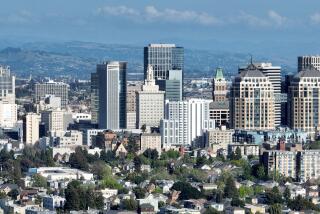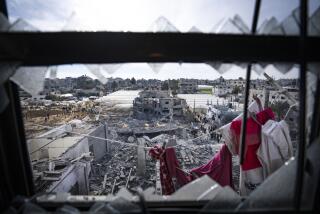Rise in crime intensifies unease in once-safe Egypt
The headlines reflect a previously unknown cruelty: a woman gunned down in a rich Cairo neighborhood, a rash of carjackings, a deadly soccer riot, a stream of smuggled arms that have given muscle to criminal gangs once easily outgunned by police.
The revolution that inspired this country one year ago has set loose a menacing air that Egyptians find unfamiliar. Bristling beneath the political battle for power against the ruling generals is an insecurity over crime and a bitterness that has darkened Egypt’s congenial nature.
Soldiers guard streets but few people feel safe. Police have largely returned to duty after months of work slowdowns, but their presence is sporadic; they appear and disappear at whim. Many Egyptians wonder whether security forces are complacent about or complicit in the mayhem around them, a sense of unease felt by fruit vendors and bankers alike.
“This is an Egypt I do not know,” said Tarek Fouad, a sales manager at an international corporation. He said he saw this bewilderment in the faces at the funeral for a relative, who was shot in a January carjacking on the affluent outskirts of Cairo.
The car he was driving wasn’t expensive, “but they murdered him to get it,” Fouad said. “We kept hearing about such crimes in the news, but now they are common. We’re having bank robberies, which is another thing we only saw in Hollywood movies and never, ever imagined they would happen in Egypt.”
There are few reliable statistics on the nationwide rise in crime. The state-run Al Ahram newspaper reported an unprecedented jump in violent crimes in 2011, largely attributed to prison breakouts and lack of police. The paper, which offered no comparable figures, said there were 2,774 killings and 2,229 kidnappings last year. The Interior Ministry said recently that crime rates were beginning to fall.
But it is the brazenness of violence that has the country troubled. Seven men burst into a bank firing weapons and robbing tellers in late January; the same day three bandits stormed an armored truck and made off with about $500,000. Days later, scores of families lined up outside a Cairo morgue, watching a broken procession of coffins that carried most of the 74 people killed in the Port Said soccer melee.
Egypt has traditionally been safer than many Western countries, but recent images have turned the nightly news into a catalog of felonies and funerals. Arms smuggled in from Libya to the west and Sudan to the south have fueled tribal clashes in southern Egypt and have wound up on the streets of the capital, where Nermeen Gomaa Khalil, a United Nations consultant, was shot and killed last week by gunmen in a passing car.
Such boldness led to the brief kidnappings this month of American and South Korean tourists in the Sinai peninsula by Bedouin tribesmen. Police have been startled by this type of lawlessness and by intensifying violence in gritty city neighborhoods that have slipped further from their grasp.
“It’s bad these days and we keep reading about crimes that never before existed in our community,” said Mohamed Radwan, owner of a Cairo gift shop. “After so many years of financial frustration under [President Hosni] Mubarak, a certain class of people is willing to do anything for more money, even if that means killing people while robbing them.”
He said political instability and months of deadly clashes between protesters and military-backed security forces give “many thugs the feeling that authorities are too busy confronting politics to chase thieves or provide security.”
Mubarak is gone, on trial for murder, but the ruling military council refuses to step aside before a president is elected in May or June, a decision that leaves the newly elected parliament, which is dominated by Islamists, with scant authority.
The fervor from the early days of rebellion has faded into a dirge-like sentiment of promises left unfulfilled. That is the Egypt one hears, whether wandering in Tahrir Square, which in an instant can turn from sad carnival to searing battlefield, or through the towns of the Nile Delta and villages deep in the deserts of the south.
Crime and unrest have also brought a strange degree of equality. The poor have noticed their worries are shared by those with bigger bank accounts and nicer homes.
“We got used to burglaries and attacks and assaults in our poor neighborhoods,” said Soad Mahmoud, a Cairo street vendor. “But I see this everywhere now, cars getting stolen and people murdered for money in places that once used to be the safest.”
In an article in Al Ahram Weekly, analyst and writer Abdel Moneim Said wondered about the volatile arc of the last year.
“When you arrive at Cairo International Airport, one of the first things you see is Barack Obama’s exhortation to American youth to learn from Egyptian youth who waged the most successful revolution in the world. Do these words still apply?” he said.
“Surely they lose their glimmer when mobs attack and kill people just like them, when families are at each other’s throats, when roads and railways are obstructed, when ears are severed and churches burned, when banks and currency exchange stores are robbed and even nuclear reactors are broken into, when security breaks down and our national currency reserves seep through our fingers, when the moment our national economy shows a sign of recovery a massacre takes place the next day. The revolution succeeded, but the nation did not!”
Hassan is a news assistant in The Times’ Cairo bureau.
More to Read
Start your day right
Sign up for Essential California for news, features and recommendations from the L.A. Times and beyond in your inbox six days a week.
You may occasionally receive promotional content from the Los Angeles Times.






